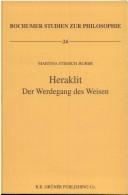Book
Year: 1902 Publisher: Leipzig und Wien : Franz Deuticke,
Abstract | Keywords | Export | Availability | Bookmark
 Loading...
Loading...Choose an application
- Reference Manager
- EndNote
- RefWorks (Direct export to RefWorks)
Book
ISBN: 9782251742151 2251742158 Year: 2014 Volume: 17 Publisher: Paris Belles Lettres
Abstract | Keywords | Export | Availability | Bookmark
 Loading...
Loading...Choose an application
- Reference Manager
- EndNote
- RefWorks (Direct export to RefWorks)
Book
Year: 1991 Publisher: Genève 12 : Droz,
Abstract | Keywords | Export | Availability | Bookmark
 Loading...
Loading...Choose an application
- Reference Manager
- EndNote
- RefWorks (Direct export to RefWorks)
Book
ISBN: 2700700694 9782700700695 Year: 1977 Publisher: Paris : Aubier-Montaigne,
Abstract | Keywords | Export | Availability | Bookmark
 Loading...
Loading...Choose an application
- Reference Manager
- EndNote
- RefWorks (Direct export to RefWorks)
Philosophy --- Mental philosophy --- Humanities --- Aphorisms and apothegms --- Heraclite, philosophe grec, vers 576-480 av. j.c.
Book
ISBN: 2707303852 2707302589 9782707303851 Year: 1995 Publisher: Paris : Éditions de minuit,
Abstract | Keywords | Export | Availability | Bookmark
 Loading...
Loading...Choose an application
- Reference Manager
- EndNote
- RefWorks (Direct export to RefWorks)
Pre-Socratic philosophers --- Présocratiques --- Heraclitus, --- Philosophie grecque. --- Héraclite d'Éphèse, --- Critique et interprétation.
Book
ISBN: 9780198803393 Year: 2022 Publisher: Oxford Oxford university press
Abstract | Keywords | Export | Availability | Bookmark
 Loading...
Loading...Choose an application
- Reference Manager
- EndNote
- RefWorks (Direct export to RefWorks)
A. A. Long presents fourteen essays on the themes of selfhood and rationality in ancient Greek philosophy. The discussion ranges over seven centuries of innovative thought, starting with Heraclitus' injunction to listen to the cosmic logos, and concluding with Plotinus' criticism of those who make embodiment essential to human identity. For the Greek philosophers the notion of a rational self was bound up with questions about divinity and happiness called eudaimonia, meaning a god-favoured life or a life of likeness to the divine. While these questions are remote from current thought, Long also situates the book's themes in modern discussions of the self and the self's normative relation to other people and the world at large. Ideas and behaviour attributed to Socrates and developed by Plato are at the book's centre. They are preceded by essays that explore general facets of the soul's rationality. Later chapters bring in salient contributions made by Aristotle and Stoic philosophers. All but one of these pieces has been previously published in periodicals or conference volumes, but the author has revised and updated everything. The book is written in a style that makes it accessible to many kinds of reader, not only professors and graduate students but also anyone interested in the history of our identity as rational animals.
Individualité --- Rationalité. --- Plotin, --- Héraclite d'Éphèse, --- Contribution au concept d'individualité. --- Self (Philosophy) --- Reason. --- Philosophy, Ancient.

ISBN: 9060323459 9786613327918 1283327910 9027276323 9789027276322 9789060323458 Year: 1996 Volume: 24 Publisher: Amsterdam Philadelphia B.R. Grüner
Abstract | Keywords | Export | Availability | Bookmark
 Loading...
Loading...Choose an application
- Reference Manager
- EndNote
- RefWorks (Direct export to RefWorks)
In der älteren Tradition wird Heraklit zu den Naturphilosophen gezählt, doch sein Denken grenzt sich vom reinen Ansammeln von Wissensmaterial und den kosmologischen Spekulationen der ionischen Naturphilosophen ab. Heraklit distanziert sich vom allgemein erfahrbaren Wissen und geht mit Hilfe der konsequenten Rückkehr zu sich selber der Erkenntnissuche nach.Die anhand einer Reihe ausgewählter Fragmente durchgeführte Untersuchung erbringt neu den Nachweis, wie Heraklit eine klare Pädagogik vorschreibt, die in manchen Aspekten spätere philosophische Denkformen vorausnimmt. Im Rahmen seiner P
Heraclitus of Ephesus --- Heraclitus, --- Eraclito, --- Geraklit, --- Heracleitus, --- Heraclit, --- Héraclite, --- Heraclito --- Hērakleitos, --- Heraklit, --- Herakʻŭlleitʻosŭ --- Kheraklit, --- היראקליטוס --- Ἡράκλειτος, --- Heraclitus --- Héraclite --- Heraclitus van Efese --- Heraclitus van Ephese --- Herakleitos --- Eraclito --- Heraclite, philosophe grec, vers 576-480 av. j.c.
Book
ISBN: 2070714497 9782070714490 Year: 1988 Volume: 136 Publisher: Paris Gallimard
Abstract | Keywords | Export | Availability | Bookmark
 Loading...
Loading...Choose an application
- Reference Manager
- EndNote
- RefWorks (Direct export to RefWorks)
Philosophes --- Philosophie et sciences --- Philosophie grecque --- Présocratiques. --- Héraclite d'Éphèse, --- Parménide d'Élée, --- Empédocle, --- Critique et interprétation.
Book
Abstract | Keywords | Export | Availability | Bookmark
 Loading...
Loading...Choose an application
- Reference Manager
- EndNote
- RefWorks (Direct export to RefWorks)
Pre-Socratic philosophers --- Présocratiques --- Aphorisms and apothegms --- Héraclite --- Heraklitus. --- Aphorisms and apothegms - Early works to 1800

ISBN: 9780472113880 Year: 2004 Publisher: Ann Arbor (Mich.) : University of Michigan press,
Abstract | Keywords | Export | Availability | Bookmark
 Loading...
Loading...Choose an application
- Reference Manager
- EndNote
- RefWorks (Direct export to RefWorks)
Biografieën. --- Filosofie. --- Griekse oudheid. --- Philosophy, Ancient. --- Vitae philosophorum (Diogenes Laertius). --- Democritus, --- Démocrite, --- Empedocles. --- Empédocle, --- Heraclitus, --- Héraclite d'Éphèse,

 Search
Search Feedback
Feedback About UniCat
About UniCat  Help
Help News
News